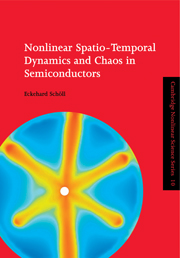Crossref Citations
This Book has been
cited by the following publications. This list is generated based on data provided by Crossref.
Wacker, Andreas
2001.
Advances in Solid State Physics.
Vol. 41,
Issue. ,
p.
199.
Akera, Hiroshi
2002.
Hydrodynamic Equations in Quantum Hall Systems at Large Currents.
Journal of the Physical Society of Japan,
Vol. 71,
Issue. 1,
p.
228.
Bode, M.
Liehr, A.W.
Schenk, C.P.
and
Purwins, H.-G.
2002.
Interaction of dissipative solitons: particle-like behaviour of localized structures in a three-component reaction-diffusion system.
Physica D: Nonlinear Phenomena,
Vol. 161,
Issue. 1-2,
p.
45.
Aoki, Kazunori
2002.
Evolution of bright (D+,X) PL pattern during impact ionization avalanche in n-GaAs.
Physica B: Condensed Matter,
Vol. 314,
Issue. 1-4,
p.
180.
Liehr, Andreas W.
Moskalenko, Andrei S.
Röttger, Michael C.
Berkemeier, Jürgen
and
Purwins, Hans-Georg
2003.
High Performance Computing in Science and Engineering ’02.
p.
48.
Amann, A.
Peters, K.
Parlitz, U.
Wacker, A.
and
Schöll, E.
2003.
Hybrid Model for Chaotic Front Dynamics: From Semiconductors to Water Tanks.
Physical Review Letters,
Vol. 91,
Issue. 6,
Aoki, Kazunori
2003.
Anomalous PL brightening caused by impact formation of a (D
+
, X) complex during an impact ionization avalanche in n‐GaAs
.
physica status solidi (c),
p.
640.
Varela, Hamilton
Bonnefont, Antoine
and
Krischer, Katharina
2003.
Trapping Electrochemical Oscillations between Self‐Organized Potential Walls.
ChemPhysChem,
Vol. 4,
Issue. 12,
p.
1348.
Friedrichs, R
and
Engel, A
2003.
Non-linear analysis of the Rosensweig instability.
Europhysics Letters (EPL),
Vol. 63,
Issue. 6,
p.
826.
Andreev, A. V.
Aleiner, I. L.
and
Millis, A. J.
2003.
Dynamical Symmetry Breaking as the Origin of the Zero-dc-Resistance State in an ac-Driven System.
Physical Review Letters,
Vol. 91,
Issue. 5,
Krischer, Katharina
Varela, Hamilton
Bı̂rzu, Adrian
Plenge, Florian
and
Bonnefont, Antoine
2003.
Stability of uniform electrode states in the presence of ohmic drop compensation.
Electrochimica Acta,
Vol. 49,
Issue. 1,
p.
103.
Denison, M.
Blaho, M.
Rodin, P.
Dubec, V.
Pogany, D.
Silber, D.
Gornik, E.
and
Stecher, M.
2004.
Moving Current Filaments in Integrated DMOS Transistors Under Short-Duration Current Stress.
IEEE Transactions on Electron Devices,
Vol. 51,
Issue. 10,
p.
1695.
Denison, M.
Blaho, M.
Rodin, P.
Dubec, V.
Pogany, D.
Silber, D.
Gornik, E.
and
Stecher, M.
2004.
Moving Current Filaments in Integrated DMOS Transistors Under Short-Duration Current Stress.
IEEE Transactions on Electron Devices,
Vol. 51,
Issue. 8,
p.
1331.
Radulovic, Nenad
Willatzen, Morten
and
Melnik, Roderick V. N.
2004.
Computational Science and Its Applications – ICCSA 2004.
Vol. 3045,
Issue. ,
p.
817.
DE LACY COSTELLO, BEN
RATCLIFFE, NORMAN
ADAMATZKY, ANDREW
ZANIN, ALEXEY L.
LIEHR, ANDREAS W.
and
PURWINS, HANS-GEORG
2004.
THE FORMATION OF VORONOI DIAGRAMS IN CHEMICAL AND PHYSICAL SYSTEMS: EXPERIMENTAL FINDINGS AND THEORETICAL MODELS.
International Journal of Bifurcation and Chaos,
Vol. 14,
Issue. 07,
p.
2187.
Plenge, F.
Li, Y.-J.
and
Krischer, K.
2004.
Spatial Bifurcations in the Generic N−NDR Electrochemical Oscillator with Negative Global Coupling: Theory and Surface Plasmon Experiments.
The Journal of Physical Chemistry B,
Vol. 108,
Issue. 38,
p.
14255.
Sevik, C
and
Bulutay, C
2004.
Gunn oscillations in GaN channels.
Semiconductor Science and Technology,
Vol. 19,
Issue. 4,
p.
S188.
Martínez, Pedro J.
and
Chacón, Ricardo
2004.
Taming Chaotic Solitons in Frenkel-Kontorova Chains by Weak Periodic Excitations.
Physical Review Letters,
Vol. 93,
Issue. 23,
Schöll, E.
2004.
Pattern formation in semiconductors: control of spatio‐temporal dynamics.
Annalen der Physik,
Vol. 516,
Issue. 7-8,
p.
403.
Zykov, Vladimir
and
Engel, Harald
2004.
Dynamics of spiral waves under global feedback in excitable domains of different shapes.
Physical Review E,
Vol. 70,
Issue. 1,



